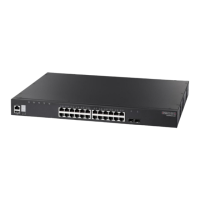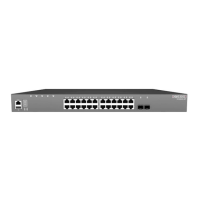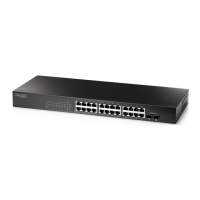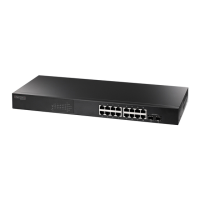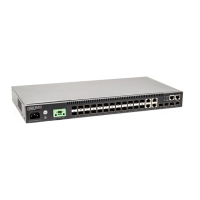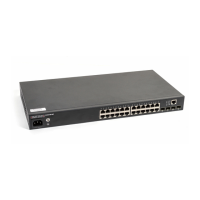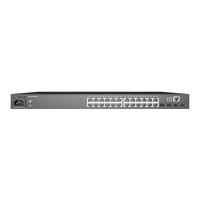Chapter 19
| Unicast Routing
Configuring the Open Shortest Path First Protocol (Version 2)
– 721 –
calculating summary route costs. Enable this field to force the router to
calculate summary route costs using RFC 1583. (Default: Disabled)
When RFC 1583 compatibility is enabled, only cost is used when choosing
among multiple AS-external LSAs advertising the same destination. When
disabled, preference is based on type of path, using cost only to break ties (see
RFC 2328).
If there any OSPF routers in an area exchanging summary information
(specifically, ABRs) which have not been upgraded to OSPFv2 (RFC 2328),
RFC 1583 should be used on the newly upgraded OSPFv2 routers to ensure
compatibility with routers still running older OSPFv2 code.
◆ OSPF Router ID – Assigns a unique router ID for this device within the
autonomous system for the current OSPF process.
The router ID must be unique for every router in the autonomous system. Note
that the router ID can cannot be set to 0.0.0.0.
If this router already has registered neighbors, the new router ID will be used
when the router is rebooted, or manually restarted using the “no router ospf”
command followed by the “router ospf” command.
◆ Auto Cost – Calculates the cost for an interface by dividing the reference
bandwidth by the interface bandwidth. The reference bandwidth is defined in
Mbits per second. (Range: 1-4294967)
By default, the cost is 0.1 for Gigabit ports, and 0.01 for 10 Gigabit ports. A
higher reference bandwidth can be used for aggregate links to indicate
preferred use as a lower cost interface.
◆ SPF Hold Time – The hold time between making two consecutive shortest
path first (SPF) calculations. (Range: 0-65535 seconds; Default: 10 seconds)
Setting the SPF holdtime to 0 means that there is no delay between
consecutive calculations.
◆ SPF Delay Time – The delay after receiving a topology change notification and
starting the SPF calculation. (Range: 0-65535 seconds; Default: 5 seconds)
Using a low value for the delay and hold time allows the router to switch to a
new path faster, but uses more CPU processing time.
◆ Default Metric – The default metric for external routes imported from other
protocols. (Range: 0-16777214; Default: 20)
A default metric must be used to resolve the problem of redistributing external
routes from other protocols that use incompatible metrics.
This default metric does not override the metric value set on the Redistribute
configuration screen (see page 734). When a metric value has not been
configured on the Redistribute page, the default metric configured on the
System configuration page sets the metric value to be used for all imported
external routes.
